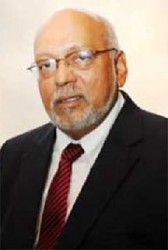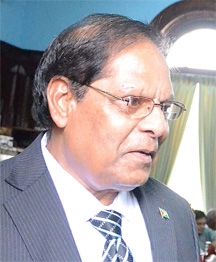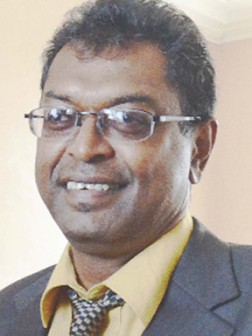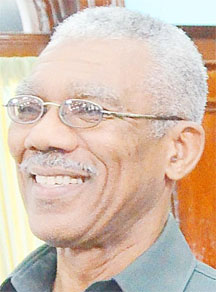An almost casual reference to a no-confidence vote against the government by AFC executive and former PPP/C stalwart Moses Nagamootoo is fast mushrooming into a high-stakes standoff with risks for both the government and opposition, analysts say.
Since being reported in Wednesday’s edition of Stabroek News as saying that his party was mulling a confidence vote which could bring the government down and trigger fresh general elections, the joint opposition has lent credence to Nagamootoo’s disclosure. Alliance For Change (AFC) Leader Khemraj Ramjattan stated on Friday that the party had received positive feedback to the idea of a motion and that one could be presented within weeks to parliament. A Partnership for National Unity (APNU) Leader, David Granger also lent to the mounting speculation when he told Stabroek News on Wednesday that the issue of a no-confidence motion against the Ramotar government will be discussed at the next shadow cabinet meeting of the coalition to be held tomorrow. He said there had thus far been no discussion between the two opposition groups which would have to vote together for the motion to succeed.
Talk about the no-confidence motion drew immediate reaction from the highest levels of government, a sign analysts say that signalled concern in the Ramotar administration that its control of the executive that has seen 30 months of continuous confrontation with the opposition and stalemate could come to a screeching halt. President Donald Ramotar himself addressed the Stabroek News report on Wednesday morning at a Private Sector Commission forum at the Pegasus Hotel, defiantly declaring that his party was ready for any eventuality that might flow from a successful motion of no-confidence. He followed this up with a press conference at State House on Saturday which seemed to have been called expressly to address the opposition’s grounds for moving for a motion of no-confidence – the spending by the government of $4.6B of the sum voted against by the opposition in this year’s budget. Ramotar also helpfully suggested that as an alternative the opposition could go to court to challenge the expenditure, a statement that might be further apprehended as trying to steer the opposition away from a confidence vote.




Other officials such as the Head of the Presidential Secretariat Dr Roger Luncheon and Minister of Legal Affairs Anil Nandlall have also attacked the grounds raised by the opposition for a confidence vote.
While the AFC first floated the vote, all eyes will be on APNU. Sources say it will have to decide whether it is prepared for the consequences of a fresh general election within three months. The key considerations would be whether an early vote would coincide with heightened support for it on the ground and the ability to immediately begin mobilising money for the inevitable high-priced campaign in which the government will have a built-in advantage. As has been pointed out by several analysts, if an election is not precipitated this year, the question of APNU’s strength on the ground and the ability to raise financing will have to be addressed in two years anyway. APNU would also be aware that even if it decided against the confidence vote, the AFC would pursue the motion anyway and score points for putting it on the parliamentary agenda and voting for it.
Analysts point out that the AFC faces the same questions as APNU and even more acutely. Several of its key backers and supporters have indicated disappointment that its seven seats in parliament have not translated into more results on the ground considering that historic inroads were made in the PPP/C’s Corentyne base. This gain was seen as peeling away the vital one seat that has given the opposition control of the National Assembly. However this has not brought heightened profile to the AFC and some of its backers have been puzzled by the seeming sidelining of Nagamootoo who was seen as the single most important factor in the securing of Corentyne votes for the AFC and a serious threat to the PPP/C. Some backers believe that many of these votes may not return to the AFC at a new election and this and other reasons may make it difficult to mobilise financing.
For the ruling party, the choices are even starker. For starters, analysts say the party will be immediately confronted with the question of who its presidential candidate would be. Ramotar who was seen as the candidate of former President Bharrat Jagdeo, produced the worst result for the PPP/C in a general election leading to Guyana’s first hung Parliament. It is widely believed that Jagdeo, who maintains significant influence in the central and executive committees of the PPP/C had favoured Ramotar as he was keen on ensuring that his programmes and business arrangements with friends were kept in place. Other viable candidates for the 2011 poll such as Ralph Ramkarran who quit after the general elections in a row over corruption were out-manoeuvred in the quest for the presidential candidacy for the PPP/C as they were seen as averse to Jagdeo’s influence.
With the worst result of the PPP/C history and a lacklustre presidency which has seen key plans such as the Amaila Hydropower project stymied and deepening economic woes on several fronts, Ramotar will not be an easy sell for a party seen as increasingly weak and having lost thousands of votes over two consecutive elections. In the weeks after a successful confidence vote, the PPP would have to grapple with the forwarding of other candidates for the presidency such as Natural Resources Minister, Robert Persaud who would be championed by Jagdeo or Culture Minister Dr Frank Anthony. Either way, analysts say there could be a bruising contest which could see others like General Secretary of the party Clement Rohee throwing their hats into the ring.
The PPP will also have to consider whether dissatisfaction with its performance will not lead to even more voters defecting from it and either voting for another group or staying at home. While many believe that the PPP/C can still win plurality at a new election there is a great possibility that its result could give it even less seats than the 32 it now holds in the National Assembly and paving the way for deeper dissent and more robust demands from the opposition on behalf of their constituency. Sources point out that the mood in the sugar belt is sour with the continuing problems in the industry. There is also a worry that migration from Region Six is continually reducing the PPP/C support base in the area.
Sources say that with the Rodney Commission of Inquiry generating negative headlines for APNU the PPP/C might have been considering early elections to take advantage of this but might have been aiming at December this year. It has commissioned a host of infrastructural projects including an ambitious $100m clean-up of Le Repentir Cemetery which it could hold up to Georgetown voters and those countrywide as a tangible result of its efforts. The opposition having perceived this may have opted to upend these plans by considering an earlier vote. Either way the decisions for all three parties are seen as rife with risk.





